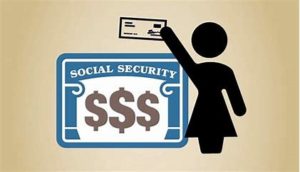“Section 2302 of the CARES Act provides that the payment and deposit of the employer’s share of the social security portion of FICA tax and the employer’s share of the social security portion of RRTA tax for deposits that are due to be made during the period  beginning on March 27, 2020, and ending before January 1, 2021, is not due before December 31, 2021 (for the first 50 percent of the liability), and December 31, 2022 (for the remaining 50 percent of the liability).”
beginning on March 27, 2020, and ending before January 1, 2021, is not due before December 31, 2021 (for the first 50 percent of the liability), and December 31, 2022 (for the remaining 50 percent of the liability).”
Blahblahblah! What this means. NONE of the matching 6.2% for Social Security/FICA and (RRTA) that employers would normally deposit/pay between March 27 and December 31, 2020 has to be deposited/paid in 2020. It does have to be deposited/paid eventually. Self-employed folks can defer 50% of their 12.4% social security tax ONLY, NOT 50% of “self-employment tax” which includes the 2.9% Medicare portion. And you don’t have to be impacted by COVID-19.
The 6.2% amount not paid becomes, in essence, an interest free loan with these repayment terms: 50% must be paid/deposited by December 31, 2021 and the remaining 50% paid/deposited by December 31, 2022. The employer still has to timely pay/deposit the matching Medicare 1.45% along with the Social Security, Medicare and federal income tax withheld from employees.
Eligible with SBA PPP – Yes. If you were one of the lucky ones to have gotten an SBA PPP loan – congratulations. You can also take advantage of the employer payroll tax deferral for additional cash flow maximization – until your lender tells you the PPP loan is forgiven. At that point, you will become ineligible for further employer payroll tax deferral. What’s already deferred, stays deferred with the same repayment terms. Keep in mind, that in the case of the PPP loan not being forgiven, it becomes a loan with these repayment terms: Due in 2-years with a 6-month payment deferral, 1% interest rate, no prepayment fees, no prepayment penalties.
Eligible with SBA EIDL – Yes.
Eligible with Paid Sick/Family Leave Credit/FFCRA credits – Yes.
Eligible with Employee Retention Credit – Yes.
We recommend each pay period that you record the unpaid/undeposited amount as a debit to expense and a credit to long-term liability. If a third-party agent, such as ourselves, or a PEO prepares your payroll and payroll reports and prepares or submits tax deposits on your behalf, IMMEDIATELY get a hold of them and let them know whether or not you want defer the employer payroll tax. Conversely, IMMEDIATELY get a hold of them should you wish to discontinue the employer payroll tax deferral.
If you need to cancel a previously scheduled EFTPS payment, call 800.555.4477. EFTPS can cancel and reschedule payments. All you have to do is suffer through high call volume and an unusually long wait time and then provide your name and Tax ID number, the exact amount of the payment, and the date of the payment.
We have noted no revision to the EFTPS website regarding the Employer Payroll Tax Deferral. Include ONLY the employees’ withheld 6.2% on the social security line.
The Form 941 for 2020, Employer’s QUARTERLY Federal Tax Return was revised April 29, 2020 to accommodate payroll tax relief provided by congressional legislation in response to COVID-19. Enter employee withheld 6.2% on line 13a and the deferred 6.2% on line 13b.
It will be important to maintain a system of periodic reconciliation of Form 941, line 13b totals to the balance sheet long-term liability account.
Part 1 of 3 – Employee Retention Payroll Credit. Part 3 of 3 – Recalling Furloughed Employees.
We are here to guide you through this process and anything else to help you get through COVID-19. Email info@accpas.com. Please put COVID-19 in the subject line. Or call us at 727-327-1999.
In addition to the monthly newsletter and weekly blog we will be sending COVID-19 updates through “Email Updates”.
Follow McAtee & Associates on your preferred social media for additional COVID-19 updates. We are on Facebook, Twitter, LinkedIn, and Google+.
Stay safe. Stay strong!
COVID-19 Disclaimer. Laws and regulations have quickly changed and will continue to change in order to mitigate the economic damage caused by the Coronavirus Crisis. New laws and regulations are being passed quicker than the legislative process has taken in the past. Guidance, clarifications, and interpretations are constantly evolving. Deadlines and due dates are being extended and re-extended. New relief and programs are constantly rising up. This is occurring on all levels: Federal, State, and Local. Information we publish may not be updated after initial publication/dissemination. We are committed to giving you the best answer possible based on what we know at the time your question is asked.
